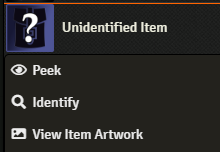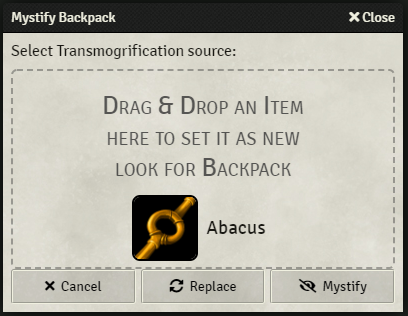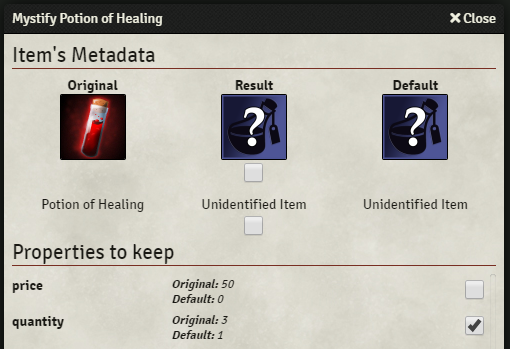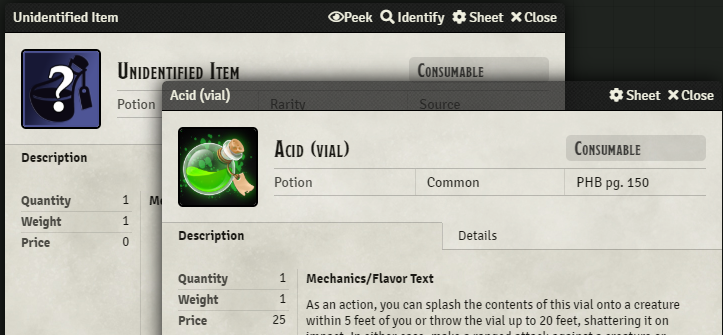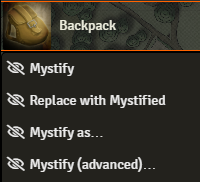This module aims to provides system agnostic solution to handle unidentified items and their identification for games via Foundry Virtual Tabletop.
NOTE: If you are a javascript developer and not a typescript developer, you can just use the javascript files under the dist folder
It's always easiest to install modules from the in game add-on browser.
To install this module manually:
- Inside the Foundry "Configuration and Setup" screen, click "Add-on Modules"
- Click "Install Module"
- In the "Manifest URL" field, paste the following url:
https://github.com/League-of-Foundry-Developers/foundryvtt-forien-unidentified-items/releases/latest/download/module.json - Click 'Install' and wait for installation to complete
- Don't forget to enable the module in game using the "Manage Module" button
| dnd5e | pf2e | wfrp4e | sw5e | swade | |
|---|---|---|---|---|---|
| Settings | ✓ | ✓ | ✓ | ✓ | ✓ |
| Logic | ✗ | ✗ | ✗ | ✗ | ✗ |
One of main principles of this module is being System Agnostic. There is however, way of integrating systems.
Basic settings initialization (like setting default persisting properties for dnd5e) I will allow to be built-in this module. These can, however, be defined from the System's side.
Right click on items in sidebar, or use buttons on Item Sheet's header to Mystify an item. It will create new apparently blank item.
Mystified item can be fully edited and works just as a normal item in that system. However, GM can at any point peek at what the original item is (currently it's not possible to edit original data).
GM can also click on "Identify" button, which transforms entire Item into original, using embedded data.
Data used during identification is decided upon at the time of mystification.
Right click on any entry in Item Directory (either Sidebar or Popup) to bring Context Menu for Items.
Will duplicate the Item, with duplicate being mystified.
Exactly as Mystify, but will replace Original Item, instead of duplicating it.
This option will create new Dialog Popup:
Drag & Drop an item which will become new "face" of Original Item. This basically allows to use some other item as template for Mystified item, instead of using Default properties
This option works like "Mystify" context menu option
This option works like "Replace with Mystified" context menu option
This option will open a Dialog Popup:
This popup allows you to choose which properties of Original Item should be kept (checkboxes checked) and which should be set as default (unchecked)
Opens sheet for Original Item allowing to "Peek" what the item really is, without identifying it.
Replaces Mystified Item with Original Item.
- If it's
World ItemorCompendium Item, it works like "Mystify" Context Menu option - If it's
Owned Itemof anActor, it works like "Replace with Mystified" Context Menu option
Works exactly like "Peek" Context Menu option
Works exactly like "Identify" Context Menu option
Mystified Item is normal item, that has all or most of it's properties reset to default ones (like when you create new Item), while saving Original Data of Source Item deep inside Item's flags. Original Data is normally inaccessible and item for the purpose of Foundry VTT and game system acts just as it would without Original Data.
Item that went through, or is about to go through "mystification". All data of Original Item is serialized and hidden within Mystified Item.
This page is meant for System and Module developers that wish to integrate their systems & modules with Unidentified Items, although some information here might be useful for people wanting to write Macros as well.
This is the only public class exposed by this module:
async game.modules.get("forien-unidentified-items").api.mystify(itemUuid, options = {replace: false, mystifiedData: undefined})
itemUuid–string– UUID of Original Item to be mystifiedoptions–Object– object of optionsoptions.replace–boolean–truemeans, Original Item should be replaced with Mystified oneoptions.mystifiedData–undefined | Object– if defined, it acts as a basis for setting data of Mystified Item. Properties not defined will be set to system's default.
This method handles the Mystification proccess. Fires the forien-unidentified-items:onMystifyItem Hook right before mystifying.
itemUuid–string– UUID of Original Item to be mystified
Alias for mystify(itemUuid, {replace: true}).
itemUuid–string– UUID of Original Item to be mystified
Opens "Mystify As…" Dialog. Callbacks for buttons fire the mystify() method with respective settings.
itemUuid–string– UUID of Original Item to be mystified
Opens "Mystify (advanced)…" Dialog. Callbacks for buttons fire the mystify() method with respective settings.
item–Item– instance of Item class to be identified
If item has OrigData flag, this method will replace Mystified Item with OrigData.
Fires the forien-unidentified-items:onIdentifyItem hook. If Hook returns false, it will not proceed with full identification.
item–Item– instance of Item class
Returns Boolean. True if item is mystified (has Original Data), false otherwise.
itemUuid–string– UUID of Original Item to be mystified
Returns Boolean. True if item is mystified (has Original Data), false otherwise.
item–Item– instance of Item class
Returns Object of item's Original Data, or undefined if it isn't mystified.
This module expands the prototype of registered Item entity class.
Returns true if item is Mystified (has Original Data), false otherwise
Returns Object of item's Original Data, or undefined if it isn't mystified.
At this hook, context menu event listener and settings are already redistered
At this hook, the ForienIdentification API class is already available under global scope
At this hook, settings are initialized (if first launch) and derived Item classes are generated and replaced the original Item classes in CONFIG.Item
There Hooks fire only once per world, they are used to initialize default state of Settings. GMs will be able to freely change settings afterwards
icons–Object– a key-value pair object containing item types as keys and image paths as values
Example for dnd5e:
{
"weapon": "modules/forien-unidentified-items/icons/inv-unidentified.png",
"equipment": "modules/forien-unidentified-items/icons/inv-unidentified-armor.png",
"consumable": "modules/forien-unidentified-items/icons/inv-unidentified-potion.png",
"tool": "modules/forien-unidentified-items/icons/inv-unidentified-tool.png",
"loot": "modules/forien-unidentified-items/icons/inv-unidentified-loot.png",
"class": "modules/forien-unidentified-items/icons/inv-unidentified-book.png",
"spell": "modules/forien-unidentified-items/icons/inv-unidentified-scroll.png",
"feat": "modules/forien-unidentified-items/icons/inv-unidentified-book.png",
"backpack": "modules/forien-unidentified-items/icons/inv-unidentified-knapsack.png"
}You can replace any path by for example:
Hooks.on('forien-unidentified-items:onInitializeDefaultIcons', (icons) => {
icons.weapon = "path/to/icon.png";
});Important note: if you perform assignment on icons, you will remove it's reference and fail to override data.
properties–Object– a key-value pair object containing item types as keys and key-pair object as value
Property Paths set to true mean they will by default be kept when mystifying items.
Example for dnd5e:
{
"weapon": {
"ability": false,
"actionType": false,
"description.chat": false,
"description.unidentified": false,
"quantity": true,
"weight": true,
"...": "..."
},
"equipment": {
"armor.dex": false,
"armor.type": true,
"armor.value": false,
"...": "..."
},
"...": "...",
"backpack": {
"...": "..."
}
}You can replace any path by for example:
Hooks.on('forien-unidentified-items:onInitializeItemProperties', (properties) => {
properties.equipment = {
"armor.value": true,
"armor.dex": true
};
});Not defined paths will be kept (so in above example, equipment.armor.type will remain true)
Important note: if you perform assignment on icons, you will remove it's reference and fail to override data.
item–Item– an Item Entity instance of Original ItemorigData–Object– result ofduplicate(item), will be directly applied toOrigDataflag and will represent Original Item data for purpose of Peek and IdentifymystifiedData–Object– data object directly destined to become Mystified Object data. Properties not defined will be set to default (as in create new Item)options–Object– options as passed tomystify()method.
If you perform changes on above parameters and keep object references, you can decide entire Mystification process.
item–Item– an Item Entity instance of Mystified ItemorigData–Object– directly taken fromOrigDataflag and represents Original Item data.
If you perform changes on above parameters and keep object references, you can influence Identification process. The OrigData flag is removed by default.
If your Hook returns false, the default Identification process will not happen. So you can perform partial identification. For example (in pseudo-code):
Hooks.on('forien-unidentified-items:onIdentifyItem', (item, data) => {
// perform skill check if identification can happen
let testResult = SomeClass.rollIdentification(data);
// If result was only partial:
switch (testResult.result) {
case 'partial':
// update description with new information
item.update({"data.description": testResult.newDescription});
case 'failed':
return false; //and stop default full identification
default:
return true;
}
});item–Item– an Item Entity instance of opened ItemSheetpermission–Object– object containing permissions. All permission default togame.user.isGM
let permissions = {
canIdentify: game.user.isGM,
canPeek: game.user.isGM,
canMystify: game.user.isGM
}If true, user can see and press Identify Header Button.
If true, user can see and press Peek Header Button to open Original Item sheet.
If true, user can see and press Mystify Header Button.
According to this module's Primary Principle, there will never be any system-specific logic in module. Feel free to integrate logic into your System or your Module, using API and Hooks
If you are System or Module developer, please read the Developers Wiki for API and Hooks references.
Also, do not hesitate to contact me with questions and for assistance.
- none currently
You can always check current and up-to-date planned and requested features here
If you have any suggestion or idea on new contents, hit me up on Discord!
npm installwill build the code and copy all necessary assets into the dist folder and make a symlink to install the result into your foundry data; create a
foundryconfig.json file with your Foundry Data path.
{
"dataPath": "~/.local/share/FoundryVTT/"
}build will build and set up a symlink between dist and your dataPath.
npm run-script buildYou don't need to build the foundryconfig.json file you can just copy the content of the dist folder on the module folder under modules of Foundry
build:watch will build and watch for changes, rebuilding automatically.
npm run-script build:watchclean will remove all contents in the dist folder (but keeps the link from build:install).
npm run-script cleanprettier-format launch the prettier plugin based on the configuration here
npm run-script prettier-formatpackage generates a zip file containing the contents of the dist folder generated previously with the build command. Useful for those who want to manually load the module or want to create their own release
npm run-script packageAny issues, bugs, or feature requests are always welcome to be reported directly to the Issue Tracker, or using the Bug Reporter Module.
This package is under an MIT license and the Foundry Virtual Tabletop Limited License Agreement for module development.
- Thanks to
Forien#2130(discord contact) - Bootstrapped with League of Extraordinary FoundryVTT Developers foundry-vtt-types.
- Icons were created by transforming assets made by Lorc and Willdabeast from game-icons.net
- Thanks to unsoluble for the idea for this Module!
- Thanks to KLO for providing Korean translation
- Thanks to rinnocenti for providing Portuguese (Brazil) translation
- Thanks to freyrrabbit for help with defining default properties for PF2e system
- Thanks to SalieriC for help with defining default properties for Swade system









